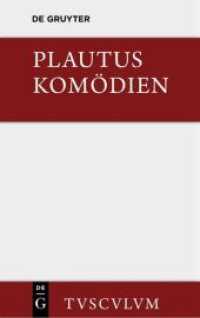- ホーム
- > 洋書
- > ドイツ書
- > Social Sciences, Jurisprudence & Economy
- > Education Science / Pedagogic
- > general surveys & lexicons
Full Description
Engendering Cosmopolitanism Through the Local presents a critique of multicultural education, which tends to focus on multiculturalism at the expense of a truly international curriculum. While lessons in multiculturalism are oftentimes well intentioned, this book begins with the premise that we do a disservice by imparting lessons in international culture and history through multiculturalism, which can perpetuate insularity even as it claims to promote global coverage. The book offers background on World Literature, a term used for one hundred years to refer to a global literary tradition; reviews the numerous challenges of reading cross culturally; and provides an overview of cosmopolitanism, a two-thousand-year-old concept referring to our ability to appreciate cultures and nations different from our own. The book also shares the stories of three teachers who engaged their students with international literature by connecting texts topically or thematically with the students' lived experiences. The book closes with suggested curriculum on modern Chinese literature. Engendering Cosmopolitanism Through the Local provides important and practical background information invaluable to courses on literacy, children's literature, multicultural education, and global studies.
Contents
List of Figures and Tables - Acknowledgments - Introduction - My Own Experience Teaching World Literature - Engendering Cosmopolitanism Through Shared Personal Experience: The Case of University Laboratory School - Reading the Bhagavad Gita at a Buddhist School: Engendering Cosmopolitanism Through Shared Religious Ideas - Engaging Student Ethnic Identity at a Hawaiian School: Engendering Cosmopolitanism through Culture-Based Values - Conclusion - Modern Chinese Literature Curriculum (with Yun Peng) - Contributor Biography - Index.





